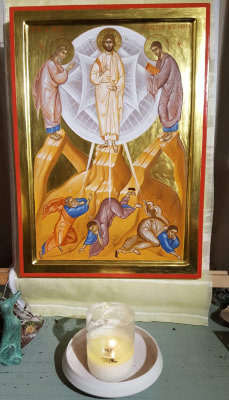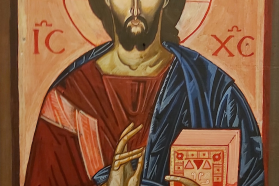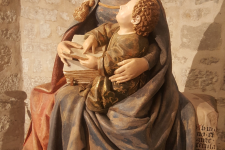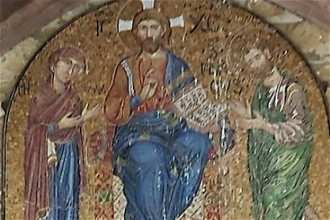Sunday Reflection with Canon Robin Gibbons - 28 February 2021

Icon by Fr Robin Gibbons
Second Sunday of Lent
The first reading this Sunday from the 22nd chapter of Genesis is, as Ellen Davis puts it in her critical essay 'The blinding horror of Abraham's faith'
(Christian Century of October 2016) "the place you go when you do not understand at all-Why does God allow us to suffer like this? Are we really expected to bear this?-and the last thing you want is a reasonable explanation, because any reasonable explanation would be a mockery of your anguish. This story of Abraham and God and Isaac is the place you go when you are out beyond anything you thought could or would happen". I have long wrestled with this appalling story of the command of God to Abraham to sacrifice his son Isaac, it was never very satisfactory to hear pious preachers talking about 'obedience to God' as the great virtue here. I have never, if I am brutally honest, found one aspect of the Christian pietistic, spiritualised, view of obedience to be laudable, because all to often it seems to indicate a totally non-rational blindness in accepting a command from somebody superior and then carrying it out.
Those who love the etymology of words will easily discover that the root of obedience is not about a one-way system; it is about discernment, dialogue, listening deeply and also the ability to refuse. I found Davis' essay enlightening because she talks about 'trust' being the key, it is absolute trust, not obedience, that helps us grapple with this dreadful story, and it is a truly dreadful tale. Somehow deep in it, in those unfathomable moments between Abraham and God something akin to the deepest love occurs in the face of insurmountable horror, Abraham finally discovers what it is to trust God and also that God has trusted in him. What of Isaac, how is he in this, desolate, betrayed, wrecked, his basic relationship destroyed? He too finds deep love, but one suspects it is going to take him a long time to get over the trauma, we know Abraham gave him everything he had and in Rebecca blessed him with a loving wife, but the real mourning of Isaac was for Sarah, his mother; 'Isaac brought Rebekah into the tent of his mother Sarah. He took Rebekah as his wife. Isaac loved her and found solace after the death of his mother'. (Gen 24: 67) Somehow the harshness of God was not his to face.
How do we cope with both this story from Genesis and the Transfiguration of Jesus that is our Gospel passage taken from Mark 9? In one sense they don't connect very well, yet, if we rest a little before the images of both tales one common denominator does appear, again that word trust. Peter James and John are trusted friends, much loved by Jesus, close to him. This event, one of the few independently attested to in Scripture (2 Pet 1:19) is again a revelation of that to Abraham, namely that is we trust in the promises and relationship of this God, revealed now to us I Jesus, we shall find ultimate love, that of the Divine Overshadowing seen as light, brilliance, impenetrable, unseen here on earth except by our trusting faith, not obedience with Christ. But this glimpse of understanding, as we see in the Transfiguration, comes at a great cost, the ultimate surrender each of us has to make, again not in obedience, but in trust when we too face the gate of death. That is why Jesus enjoined on them silence until the son of man had risen from the dead.
I suppose that in the end, no matter where we are, nor how horrible the tortures we see inflicted by humans on each other, no matter what deceit and lies we may spread or encounter, we must trust, as so many have had to, in the loving depths of God, we have no other alternative, and that is what Abraham found!
Peter attests to the Transfiguration
2 Peter 1:16-19
For we did not follow cleverly devised stories when we told you about the coming of our Lord Jesus Christ in power, but we were eyewitnesses of his majesty. He received honour and glory from God the Father when the voice came to him from the Majestic Glory, saying, "This is my Son, whom I love; with him I am well pleased." We ourselves heard this voice that came from heaven when we were with him on the sacred mountain.
We also have the prophetic message as something completely reliable, and you will do well to pay attention to it, as to a light shining in a dark place, until the day dawns and the morning star rises in your hearts.
From The blinding horror of Abraham's faith
by Ellen F Davis
October 13, 2016
Relationship with the real God, the God of Abraham and Jesus, is not for the risk-averse. The book of Genesis puts it to us straight: sometimes being in relationship with the real God hurts like hell. Sometimes it's bewildering: we'll be inching along in the dark, with no vision of where this relationship is taking us. But the gospel also puts it to us straight: it's taking us to the cross and on to resurrection. It's taking us straight into the arms of God. It's taking us into a parent's aching yet indomitable love, the divine Love that will not let us go-not ever. We can put our trust in that.
French Hymn for the 2nd Sunday of Lent
Translated by Canon Robert Gibbons
Transfiguration
You heal our souls Lord Jesus Christ,
Healer of peoples,
Healer of all living creatures.
From the depths of our being and from the inner darkness,
You take our hand and guide us on our way,
Upwards, to climb the mountain of our stories,
The highs and lows, throughout our night and day.
You heal etc.
Then with John who could not bear the wondrous light
And James who hid his face in tired contemplation
With Peter who grasped to hold the cloud that fell
We too close our eyes at your transfiguration
You heal etc
Around us we sense the whiteness of this glory
Too hard, to strong for mortal eyes to bear,
And yet on this mountain, the Tabor of our limits
Lord Christ you bid each of us to come and stare
You heal etc.
We raise our heads and look towards this brilliance
Its warmth; not cold nor hot, yet possessing all our space
Its dazzle, sprinkling us with clouds of radiant whiteness,
The Glory, your eternal presence, gift of love and grace
You heal etc.


















